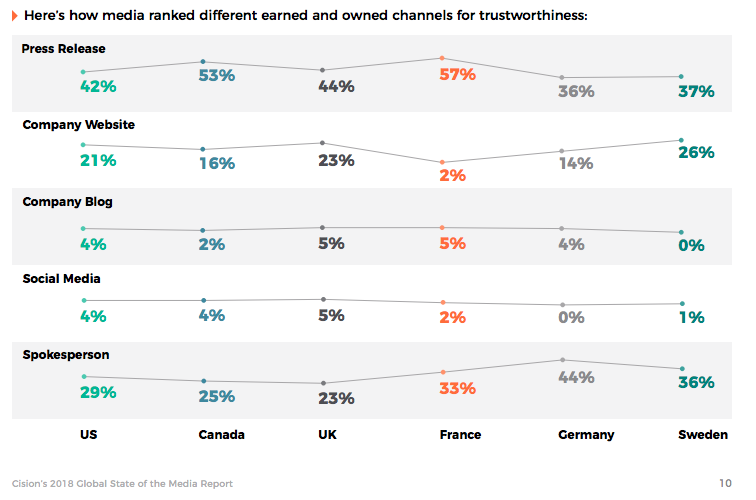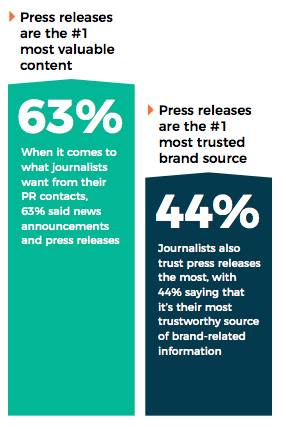In Press Releases We Trust: Why They Matter More Than Ever in the Fake News Era
May 2nd, 2018 by
Cision, an ever-growing resource for media and businesses, released their 2018 State of the Media report, which is based on a survey of journalists globally.
Over 1300 journalists responded from six countries, 48% of which work in print (newspaper and magazine), and most of which no doubt have an online version of their publication.
Per the Report, These Are the “Key Takeaways”
• Being accurate is more important than being first.
• Journalists are concerned about fake news and trust in the media.
• Reporters and editors still trust the press release the most.
• PR professionals are being asked to provide accurate, newsworthy information.*
The most actionable insight for businesses is that “reporters and editors still trust the press release the most”—42% rank press releases as the piece of owned media they trust most for accurate information, followed by 29% for a spokesperson, 21% for a company website, and just 4% each for company blog and social media.


This was in some way surprising, as, there are so many articles online that reference other news stories. I’m sure you can recall reading something like “…according to a report by The New York Times.” This may be taboo for some publications, so, for your news to be considered as a topic, it’s critical you are publishing press releases for your company news.
The Best Ways for You to Distribute Press Releases Are:
- Publishing on your own website (even if the info lives elsewhere like on your blog)
- Distributing through a service like Cision (PRWeb & PRNewsWire)
- Sending directly to journalists that have a specific interest in your industry, topic, or business—as the survey says, 27% of journalists say to “tailor the pitch to their beat” (a surprisingly low percentage in this age of personalization).


SEO & Press Releases Have a Complicated History
In 2013, with the release of Google’s Penguin algorithm update, there was a lot of chatter in the SEO community about stopping press releases as a link-building tactic. At the time, it was a paid way to generate links back to your site, which is frowned upon. At that time, many services, including PRWeb, changed outbound links to assure they would not penalize your Google rankings (by updating the links to be “nofollow”). Of course, companies continued to publish press releases, especially those who never once thought of PR as an “SEO tactic.”
In short, take backlinks out of the discussion—distribution of press releases via reputable online sources like Cision is about getting news about your brand out there in a scalable way, which can have a positive downstream impact on your search engine rankings via brand building.
Tell Me More!
To fully dive into the State of the Media report, which goes deeper into thoughts on trust and “fake news,” download it from Cision’s website.
Graphics courtesy of Cision’s State of the Media Report.
* Key takeaways sourced from Cision’s 2018 State of the Media report.

